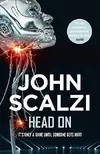John Scalzi - Lock In.
View attachment 137355
Blurb
Not too long from today, a new, highly contagious virus makes its way across the globe. Most who get sick experience nothing worse than flu, fever and headaches. But for the unlucky one percent - and nearly five million souls in the United States alone - the disease causes "Lock In": Victims fully awake and aware, but unable to move or respond to stimulus. The disease affects young, old, rich, poor, people of every color and creed. The world changes to meet the challenge.
A quarter of a century later, in a world shaped by what's now known as "Haden's syndrome," rookie FBI agent Chris Shane is paired with veteran agent Leslie Vann. The two of them are assigned what appears to be a Haden-related murder at the Watergate Hotel, with a suspect who is an "integrator" - someone who can let the locked in borrow their bodies for a time. If the Integrator was carrying a Haden client, then naming the suspect for the murder becomes that much more complicated.
I do like John Scalzi as an author, his Old Mans War books that I have previously mentioned here are a very good read. This book is another of his that is easy to get into (once you get past the explanation of the disease at the beginning of the book).
Without giving away any spoilers here is my best description of the disease that will help the book make sense to you...
Most of those afflicted with it cannot move their bodies but their brains work fine, so they are stuck in bed.
Through an interface in their brains, they can use surrogate bodies (Like the Bruce Wills film Surrogates, but the bodies look like the robot in the Will Smith film, not a human replica).
They can also meet in a virtual reality area similar to the game in Ready Player One.
A very small percentage still have use of their body, but also have the ability to let another afflicted person take it over (like in the Red Dwarf episode Body Swap).
It seems like a strange setup and I admit it took me a while to wrap my head around it, say about 15% into the book. However, once I understood the dynamics, then the book became a lot more enjoyable. So my recommendation is that if you can understand the logistics of how people with the disease interact, both with each other and 'normal' people, then you will enjoy this I am sure. It does not have as many humorous moments that Scalzi's other books feature, but for a police procedural/murder mystery it is a very clever tale.
Reviews
1. I was a little surprised by this book. In some ways, it's sci-fi but not rocketships-and-lasers sci-fi. In other ways it's a mystery, but not the Victorian-style Sherlock sort of thing. It's also kind of a police procedural. Maybe a bit of a... thriller? I dunno...
Honestly, I'd hesitate to classify this book as one particular thing, which means it's sufficiently complex to be a story in its own right....
* It's been a while since I last did a review, been working my way through some series that I have previously reviewed the book #1 of in this thread (Richard Stark Parker series, Martha Wells Murderbot Diaries, and a goodly amount of Ed McBain 87th Street series,) but didn't think spamming the thread with books in a series would be appreciated.















